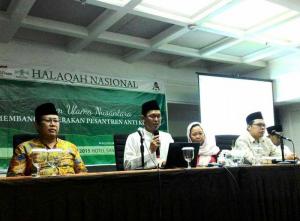NU clerics recommend death penalty for coruptors
NU Online · Kamis, 30 Juli 2015 | 11:28 WIB
Yogyakarta, NU Online
Muslim clerics across the nation have urged law enforcement agencies and courts to be steadfast in dealing with corruption and money laundering, and bold enough to hand down death sentences to those found guilty of corruption.
<>
The religious leaders from the country’s largest Islamic organization Nahdlatul Ulama (NU) said corruption and money laundering were extraordinary crimes against humanity because of their adverse impacts on the nation, state and community.
“We clerics are in favor of the death penalty if conditions are supportive and requirements are met,” Chairman of Lawmaking Board of NU KH Ahmad Ishomuddin told the media in Yogyakarta on Wednesday.
The recommendation on the death penalty for those involved in corruption was one of the seven points of the “Recommendation on Prevention and Eradication of Corruption and Money Laundering” directed at the government.
The recommendation was part of the conclusion of the two-day Nusantara (archipelago) Cleric Assembly themed Building Pesantren Anti-corruption Movement, organized by the NU and the Gusdurian Network National Secretariat in Yogyakarta, which began Tuesday. Gusdurian is a network of activists who promote the ideas on peace and pluralism of former president KH Abdurrahman “Gus Dur” Wahid.
The meeting was attended by 30 religious figures from 27 cities in 10 provinces across the country.
“Among the requirements [for the death penalty] are if corruption and money laundering are committed at a time when the country is in peril, during economic or social crises, or committed repeatedly,” added Ishomuddin.
Meanwhile, Umar Faroeq, from the Ma’had Jami’ah Pesantren STAI Mathali’ul Falah Islamic boarding school in Pati, Central Java, said Nusantara clerics also studied about the death penalty handed down to corrupt people from the viewpoint of Muslim clerics long ago.
“It exists in the Maliki and Hanafi [Islamic teaching] schools, and the condition is very clear, that is, when it is done repeatedly,” said Umar.
He added that an edict on the death penalty for corrupt people had not been issued by clerics from long ago because they were very careful and paid attention to aspects of human rights.
“But now we are in a time of crisis and it’s time to implement it,” he pointed out.
Umar said the recommendation also described various forms of corruption, such as bribery, embezzlement, looting, extortion, power abuse, theft and fraud.
Money laundering is categorized as a sin according to Islamic perspectives, because it is part of a conspiracy of sin and enmity, harms the government, business world and economic system, encourages crime and puts people in danger, he added.
Gusdurian Network coordinator Alissa Wahid said the recommendation also served as a basis for the NU to carry out anti-corruption measures based in Islamic boarding schools.
“The recommendation will enable Islamic boarding school caretakers and Islamic-based schools as well as members of the NU community to understand corruption,” said Alissa.
The eldest daughter of Gus Dur added that the recommendation would also be conveyed to clerics attending the 33rd NU Congress in Jombang, East Java, in early August.
Meanwhile, Yogyakarta Legal Aid Institute (LBH Yogyakarta) director Hamzal Wahyudin said he agreed that serious measures needed to be taken to eradicate corruption, but disagreed with the death penalty for such offenses.
“The death penalty is against basic human rights so it is not feasible in Indonesia,” said Hamzal.
He said there were alternative forms of punishment that could serve as deterrents, such as a life sentences, deprivation and revoking the political rights of those found guilty.
“I believe they are sufficient,” he stressed.
The following are the clerics particpiating in the two-day Nusantara (archipelago) Cleric Assembly themed Building Pesantren Anti-corruption Movement
KH Ahmad Ishomuddin (Chairman of Lawmaking Body / Rais Syuriah of NU)
KH Suhri Uthman (Pesantren Anwarul Hidayah)
H Muhammad Suardi, BA. Tk. Bagindo (Vice Chairman of NU West Sumatra)
KH Mohammad Dian Nafi '(Problems Deliberation Council /LBM of NU Central Java)
Nyai Hj. Alissa Q. Wahid (National Coordinator OF GUSDURian Network)
KH Umar Farouq (Pesantren Ma'had Mathali'ul Falah, Kajen Pati)
KH Luqman Hakim Haris Dimyathi (Pesantren Termas Arjosari, Pacitan)
KH Dr. Afifuddin Harisah (Pesantren An Nahdlah, Makassar)
KH Abdul Muiz Ghazali (Fahmina Institute, Cirebon)
Kiai Izet Abu Dhar (Pesantren Miftahus Sa'adah, Banjaran)
H Sahuri (lecturer of Bandung Islamic University)
KH Abu Bakr Rahziz (Pesantren Mahasina, Bekasi)
KH Dr. Nurul Huda Maarif (Pesantren Qotrotul Falah, Serang)
KH Ahmad Labib Asrori (Pesantren Raudlotut Tulab, Magelang)
Hj. Nur Laela Diryat (Pesantren Al Falah)
KH Hasan Abdullah (Pesantren Salafiyah, Mlangi Yogyakarta)
KH Shihabuddin (Pesantren Nurul Huda, Malang)
KH Khoirun Niat (Pesantren Annur Ngrukem, Bantul)
Mariatul Asiya (LK3 Banjarmasin)
KH Jazilus Sakhok (Pesantren Sunan Pandanaran, Sleman)
Diana Handayani Suryaatmana (Lakpesdam NU, Cimahi)
KH Herman Alim M (Pesantren Al Asy'ariah, Pontianak)
Kiai Iyan Fitriyana (Pesantren Al Hidayah, Lebak)
Subhan Ahmad Burhan (NU Batang, Central Java)
Ahmad Suaedy, MA (Abdurrahman Wahid Center)
Miftahul Jannah (Chairwoman of Fatayat NU Banten)
Ahmad Murtajib (STAINU of Kebumen)
Hifdzil Alim, SH, MH (Lecturer of UIN Sunan Kalijaga)
Terpopuler
1
Gerhana Bulan Total Bakal Terlihat di Seluruh Indonesia pada Selasa 3 Maret 2026, Dianjurkan Shalat Khusuf
2
Gus Yahya Sebut Kepergian Ketum Fatayat Margaret adalah Kehilangan Besar bagi Keluarga NU
3
Ali Khamenei Wafat dalam Serangan Israel-Amerika
4
PBNU Instruksikan Qunut Nazilah Respons Agresi Israel-AS ke Iran
5
Innalillahi, Ketum Fatayat NU Margaret Aliyatul Maimunah Wafat
6
Ketua Umum PBNU Mengutuk Serangan AS-Israel atas Iran
Terkini
Lihat Semua
















